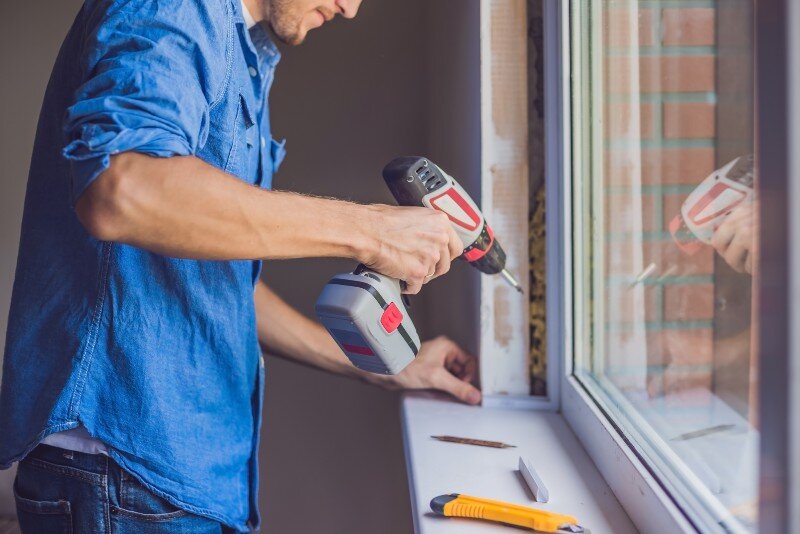
Do you need to sell a house with many things that require fixing? If you add up the costs of making all those upgrades and renovations, you may realize that you can’t afford them. You may wonder which upgrades are necessary and which you can skip.
Today, you’ll learn what you don’t need to fix when selling a house. Read on to discover which things don’t require fixing and why.
Fixing a House Before Selling
As a general rule, home improvements before selling a house make it more attractive to potential buyers, thus increasing the home’s value and allowing you to increase the sale price. Often, the return on investment on new appliances and other upgrades is significant.
However, some repairs are not only unnecessary but not worth it. Those can include home repairs that home buyers don’t care about or won’t even notice during showings. As a home seller, it’s crucial to know which repairs improve the value of your home and which aren’t worth it.
Note that you don’t always have to fix a home before selling it. If your house suffered a large fire, or you inherited a neglected home that requires a significant makeover, there are other ways to sell the house without spending a large amount of money on repairs.
Selling a house in poor condition is possible, but you need to know which buyers to target. It’s a deal breaker for most buyers, which is why you should target cash buyers instead of using a realtor to find traditional buyers. Cash home buyers in Texas buy homes as-is all the time, even those in disrepair.
You can also sell to an experienced real estate investor who is looking for a fixer upper to invest in. They have money to invest in repairs and are happy to do so, knowing they can resell the house later for a better price.
Can House Fixes Add Value to Your Property?
Absolutely. House fixes can add significant value to your home, making it easier for a real estate agent to sell your home at a higher price.
That starts with your home’s exterior. Hiring a landscaping company to plant bushes around your home and mow your lawn will improve its curb appeal. Another way to enhance your home’s curb appeal is to repaint the exterior, ideally with neutral colors. Typical paint colors include white, gray, brown, and even blue.
Even repairing cosmetic flaws on the interior will increase the value of your home, as your house will make a better first impression on prospective buyers looking to move into a new home.
However, focusing only on cosmetic flaws is a bad idea. You also need to ensure there are no serious structural, plumbing, or other defects, as those issues will become apparent in a home inspection.
You must deal with such issues before selling through a local agent. A homeowner taking out a mortgage on your home will need approval from the lender, who will send a home inspector to ensure the house is worth lending money for. If there is foundational damage, for example, they may deny the mortgage after seeing the inspection reports.

What To Fix When Selling a House
The first thing you should address if you want to sell a house fast in Houston is normal wear and tear.
That starts with applying a fresh coat of paint, making your home look new. You might wonder why normal wear and tear is worth repairing, but it all comes down to the first impression your home gives off. Furthermore, such damage is relatively cheap to improve, and the returns are significant.
For example, hairline cracks can be unsightly, but all you usually need is some caulk to repair them. That’s if they are tiny. If they are bigger, they may be a sign of structural damage.
Installing new hardwood floors is another way to make your home look better. You should also declutter your home and do a deep cleaning, so it seems fresh, spacious, and welcoming.
What Not To Fix When Selling a House
Not everything is worth fixing. Often, you end up spending money on questionable expenses that won’t bring you a significant return or help you sell your house quicker. Here are five things you don’t need to fix when selling a home.
The first is minor electrical and plumbing issues.
Minor electrical issues are typically not an issue to many buyers. For example, a light switch that doesn’t work is typically something buyers can deal with themselves, although you must disclose such issues when making a home sale. The same goes for minor plumbing issues.
The second thing you don’t need to fix is your working appliances and nice furniture, even if they are not new.
Some sellers think buying new appliances will make their homes more attractive, but that’s not always the case. Often, buyers are perfectly happy with lightly-used appliances. If they are very old, however, and don’t work well or pose safety risks, you should replace them.
What about new furniture? Unless a piece of furniture looks terrible, don’t bother replacing it. For example, you don’t want to leave buyers a couch your dog chewed up. However, replacing all the furniture with new furniture might backfire on you.
Your home might look cozy and homely as it is now. Buying new furniture can change your home’s color scheme and overall look, making it appear less natural. In fact, older furniture can give our home a retro or antique look, which some buyers might adore.
Replacing your furniture can cause your home to lose its soul, so to speak. Certainly, don’t rent furniture just to stage your home and make it look better. You’d be surprised, but some people do that.
The third thing you don’t need to fix is major room upgrades. A kitchen remodel can, indeed, significantly improve your home’s value. However, is it worth it? Not if you’re trying to sell your house fast.
Significant upgrades, such as finishing your basement, remodeling a kitchen or bathroom, adding a new addition to your home, or adding an extra home office, can stretch out and take longer than you expected. Having construction work going on can be a major turnoff to buyers.
To make an excellent first impression, you need to present a neat, clean home. Having construction materials lying around, along with the dust and clutter that come with construction, isn’t a good look. If you aren’t sure you’ll be able to finish those renovations on time, or if you are in a rush to sell your house, it’s best to avoid them.
The fourth type of upgrade to avoid is the partial fix. For example, you may think installing new bathroom faucets will make your home more attractive. However, if the rest of the bathroom is outdated, the modern faucets will look out of place. It will look like you’re trying to hide something by installing something flashy.
As a side note, making minor repairs to hide significant structural damage or other problems is not a good strategy. A home inspector will make a note of those issues, and the buyer will find out about them.
Partial fixes can also make it look like you ran out of money. That matters because if the buyer thinks you have no money to spend on upgrades, they will think you are desperate to sell your home. They may give you a lower offer than you want, causing those minor partial upgrades to backfire on you.
It’s best to simply sell your home with minor flaws like an old faucet instead of spending too much time, money, and effort repairing every small thing. That’s unless you have the time and money to give your bathroom, kitchen, and other rooms complete makeovers.
Finally, the last things not to fix are those that violate current building codes if the law grandfathers your home into the old codes. If you have an older home, you (or the previous owner) may have built it according to the building and zoning regulations of the time, even if they violate current laws.
The government may have updated local building codes, but that doesn’t always mean you have to repair your home. Often, building codes will contain a clause that “grandfathers in” older homes that existed prior to the new regulations, only requiring new structures to follow them.
While these flaws may come up in the home inspection report, that doesn’t mean you have to fix them. A local contractor can help you determine whether you need to make changes to your structure.
Final Thoughts
One of the best ways to avoid making repairs when selling a home is to sell to a cash buyer. We buy houses Arlington buyers love, regardless of their condition. Whether your home has cosmetic damage that you can’t afford to repair or significant structural damage, get in touch with us.
Our process is simple. Start by telling us about the home. We’ll make a no-obligation, fair cash offer. We don’t charge any fees or commissions! Once you accept the offer, we will close on your schedule on a date that works for you.
